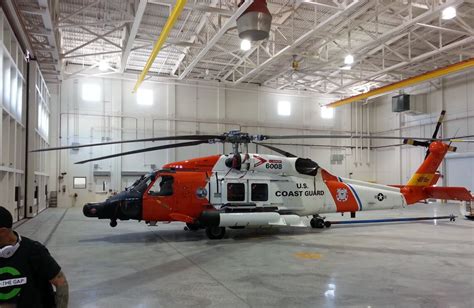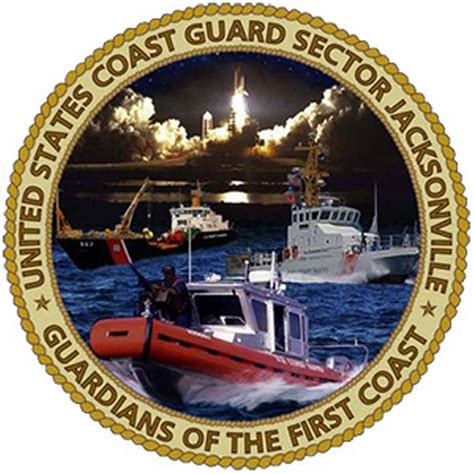Uscg Stations In Florida

The United States Coast Guard (USCG) is an integral part of maritime operations and safety, and its presence in Florida is extensive. With its headquarters in Washington, D.C., the USCG operates a network of stations along the Florida coastline, each equipped with dedicated personnel and resources to ensure the safety and security of the region's waterways.
Overview of USCG Stations in Florida

Florida's unique geography, with its extensive coastline and numerous inlets, requires a robust USCG presence. The state is home to several USCG sectors, each overseeing a specific area and managing multiple stations. These stations play a crucial role in search and rescue operations, law enforcement, and environmental protection.
Key USCG Sectors in Florida

- Sector Miami: Encompassing the southeastern region of Florida, Sector Miami is responsible for a vast area, including the Florida Keys and the Gulf of Mexico. This sector operates several stations, such as the Miami Beach Station and the Key West Station, which are vital for quick response times in this popular tourist destination.
- Sector Jacksonville: Covering the northeastern part of Florida, Sector Jacksonville manages stations along the Atlantic coast, from St. Augustine to the Georgia border. This sector is essential for monitoring and securing the busy shipping lanes and recreational boating areas.
- Sector St. Petersburg: With a focus on the central west coast of Florida, Sector St. Petersburg oversees stations like the St. Petersburg Station and the Fort Myers Beach Station. These stations are crucial for safeguarding the numerous islands and waterways in this region.
- Sector Mobile: While not entirely within Florida, Sector Mobile extends into the western panhandle, including Pensacola and Perdido Key. This sector collaborates with Florida's stations to maintain safety in the Gulf of Mexico.
Services and Responsibilities of USCG Stations

USCG stations in Florida provide a wide range of services, including:
- Search and Rescue (SAR): The primary responsibility of the USCG is to respond to distress calls and conduct search and rescue operations. With their advanced technology and well-trained personnel, they are equipped to handle emergencies efficiently.
- Maritime Law Enforcement: USCG stations enforce federal laws and regulations on the water, including drug interdiction, immigration enforcement, and fisheries management.
- Aids to Navigation: They maintain and operate navigation aids such as buoys, lights, and beacons to ensure safe passage for vessels.
- Environmental Protection: USCG personnel respond to pollution incidents, such as oil spills, and work to minimize their impact on the environment.
- Marine Safety: They conduct vessel inspections, promote boating safety education, and enforce safety regulations to prevent accidents.
Station Locations and Contact Information

Here is a table outlining some of the key USCG stations in Florida, along with their locations and contact details:
| Station Name | Location | Phone Number |
|---|---|---|
| Miami Beach Station | Miami Beach, FL | (305) 535-4628 |
| Key West Station | Key West, FL | (305) 292-8161 |
| St. Petersburg Station | St. Petersburg, FL | (727) 893-3278 |
| Fort Myers Beach Station | Fort Myers Beach, FL | (239) 463-6111 |
| Pensacola Station | Pensacola, FL | (850) 453-4253 |

🚨 Note: This list is not exhaustive, and there are additional USCG stations in Florida. For a complete list, visit the official USCG website or contact the nearest sector headquarters.
How to Request Assistance from USCG Stations

In case of an emergency on the water, it is crucial to know how to contact the USCG. Here are the steps to request assistance:
- Dial 911: If you are in immediate danger, call 911 and request the USCG.
- Use VHF-FM Radio: For marine emergencies, use channel 16 on your VHF-FM radio to contact the USCG. Provide your location, the nature of the emergency, and any other relevant details.
- Use a Marine Radio: If you have a marine radio, you can contact the nearest USCG station directly using their assigned radio frequency.
- Mobile App: The USCG offers a mobile app called "USCG Force" which allows you to report emergencies and access important information.
Training and Education Opportunities

USCG stations in Florida also offer training and education programs to the public. These programs aim to enhance boating safety and awareness, and they are often free or available at a minimal cost.
- Boating Safety Courses: Basic and advanced boating safety courses are available to teach navigation, weather interpretation, and emergency procedures.
- Aids to Navigation Training: Learn about the different types of navigation aids and how to use them effectively.
- Environmental Awareness Programs: Participate in workshops and seminars to understand the importance of environmental protection and how to minimize your impact on the marine ecosystem.
Volunteer Opportunities with the USCG

The USCG relies on dedicated volunteers to support their mission. Volunteering with the USCG offers a unique opportunity to contribute to maritime safety and gain valuable experience.
- Coast Guard Auxiliary: Join the Coast Guard Auxiliary, a civilian volunteer organization that assists the USCG in various roles, including boating safety education, vessel safety checks, and search and rescue operations.
- Community Service Programs: Participate in community service events organized by USCG stations, such as beach cleanups or educational outreach programs.
Conclusion

The USCG stations in Florida are a vital part of the state's maritime infrastructure, ensuring the safety and security of its vast coastline. From search and rescue operations to environmental protection, these stations play a critical role in maintaining the well-being of Florida's residents and visitors. By understanding the services and contact information of these stations, individuals can make informed decisions and take appropriate actions in times of need.
What is the role of the USCG in Florida’s maritime industry?

+
The USCG is responsible for ensuring the safety and security of Florida’s waterways. They conduct search and rescue operations, enforce maritime laws, and provide aids to navigation to support the state’s thriving maritime industry.
How can I become a volunteer with the USCG in Florida?

+
You can join the Coast Guard Auxiliary or participate in community service programs organized by USCG stations. These opportunities allow you to contribute to maritime safety and gain valuable skills.
What are the benefits of taking boating safety courses offered by the USCG?

+
Boating safety courses provided by the USCG are designed to enhance your knowledge and skills as a boater. By completing these courses, you can improve your navigation abilities, understand emergency procedures, and ensure a safer experience on the water.
How can I report a pollution incident to the USCG in Florida?

+
If you witness a pollution incident, such as an oil spill, you can contact the USCG by calling their emergency number or using the “USCG Force” mobile app. Provide as much detail as possible about the incident to assist in the response.
Are there any upcoming events or training sessions organized by USCG stations in Florida?

+
Yes, USCG stations in Florida regularly organize events and training sessions for the public. These can include boating safety workshops, environmental awareness programs, and community outreach initiatives. Stay updated by visiting their official website or following their social media channels.


